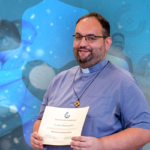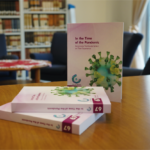A personality who had a strong influence in the knowledge and reflection on Fr. Dehon and Dehonian spirituality, Fr. Yves Ledure scj has died at the age of 88. Here is a personal remembrance of Fr. Stefan Tertünte, former director of the Dehonian Studies Center in Rome.
After the recent death of Fr. André Perroux scj, now Fr. Yves Ledure scj, another Dehonian personality, who had a decisive influence on our knowledge and reflection on Léon Dehon and Dehonian spirituality in our congregation and beyond has passed away. As a German Dehonian, I could write much about the fraternal and friendly relations he had with the German Province. Even his philosophical work could be a topic all its own. However, in this short contribution, I would like to accentuate some aspects of his work, which might clarify in some way – incompletely – the significance of Fr. Yves Ledure upon never-ending process of our search and formulation of the identity in the Congregation, a significance that will continue beyond his death.
A return to the sources
In the Congregation we have become accustomed to the green and brown volumes of Notes sur l’Histoire de ma vie (since 1975) and Notes Quotidiennes (1988). What we forget that we have somehow lost sight of the fact that at least the first three volumes of the Notes Quotidiennes, then still typewritten, had already been published several years earlier. In 1964, in the French Scholasticate in Lyon, the young priest Yves Ledure, at the time only thirty years old, had done the translation with an extensive introduction. His main academic expertise was philosophy, which he taught and researched mainly at the Institut Catholique de Paris. He was not a philologist, nor a historian, nor a theologian. He had no more training than normal for priests. The passion of his life through study of texts and contexts was to know more and more about the person of Léon Dehon, his personality, his work, his spirituality. Above all he sought to rethink and reformulate him within the contexts of today.
A place for Dehon in the public sphere
Yves Ledure always sought to have his writings on Dehon published by recognized publishing houses. For this the contacts he had developed during his university career proved to be very useful. This was not a matter of personal vanity. Rather, he wanted to make Dehon accessible to as wide an audience as possible and to raise the scholarly perception of Dehon. Only through widely published works on Dehon by scholars would the Dehon not only be noticed but also studied and cited. That is why his “Petite vie de Léon Dehon,” published in 1993 by Desclée de Brouwer; “Prier 15 jours avec Léon Dehon,” published in 2003 by Nouvelle Cité; and “Le Père Léon Dehon 1843-1925, Entre mystique et catholicisme social,” published by Les Editions du Cerf in 2005, made Dehon accessible to a wider audience in a way that was not possible through purely internal congregational publications.
A place for Dehon in academic research
Yves Ledure wanted to give Dehon a place in academic discourse, especially in historical research. He knew that researchers must be given good reasons and good opportunities to make the Dehon an academic issue. A highlight of these efforts was undoubtedly the colloquium he organized on the occasion of the centenary celebrations of Rerum Novarum. The colloquium was attended by the great names in the historical sciences of the time. A number of these experts did significant research on Dehon on this occasion: Pierre Pierrard, Dominique Durand, Jean-Marie Mayeur, Philippe Levillain and others. In 1992 Ledure published the proceedings of the colloquium under the title “Rerum Novarum en France. Le P. Dehon et l’engagement social de l’Eglise,” published by Editions universitaires in Paris. The value of the publication consists not only in the numerous contributions dealing with Dehon’s social and societal engagement but also the high level of the contributions. Without this research and the other publications already mentioned, Dehon would never have been mentioned several times in Volume 11 in the standard work of Church history “Histoire du Christianisme.” And someone like Pierre Pierrard would never have included Dehon in the list of “Ces croyants qui ont fait le siècle ” (Bayard, 1999).
The event of the non-beatification: setback and, at the same time, a challenge
I never asked Fr. Ledure about how he experienced the nonbeatification of Fr. Dehon in 2005. No doubt it was a major blow for him and his efforts. After all, he had written two publications, “Prier 15 jours avec Léon Dehon” in 2003 and “Le Père Léon Dehon 1843-1925: Entre mystique et catholicisme social” in 2005, just ahead of the beatification. One can imagine that it affected him personally that French newspapers spoke of Dehon as the “anti-Semitic priest.” He simply did not want to accept the flat accusation of anti-Semitism. While the historical commission announced by the Vatican never materialized, Yves Ledure in the midst of great ecclesiastical difficulties, organized a seminar in Paris, whose contributions were published by Desclée de Brouwer/Lethielleux under the title “Catholicisme social et question juive. Le cas Léon Dehon (1843-1925)”. Once again, the contributions on this aspect of Dehon’s work came from qualified Dehonians and recognized historians: Jean-Marie Mayeur, Jacques Prévotat, Joseph Famerée scj, Marcello Neri scj, Jean-Yves Calvez sj, Philippe Boutry, etc. They showed that the issue required a much more complex and differentiated treatment and downplayed the generic accusation against Dehon. But no one wanted to hear the arguments. It is irritating that academic world refused to take notice of the book and, to put it crassly, boycotted it.
His work: a question of identity
Due to lack of sufficient knowledge, I cannot judge the work of Fr. Yves Ledure. It is clear that he has written many very useful biographical books and articles on Dehon. He repeatedly made hermeneutical attempts to create a dialectic between the collective memory and ever-new insights – not only historical – into a current reformulation of Dehonian identity. He did this most prominently in “Le Code du Royaume. Léon Dehon et la spiritualité du Coeur de Jésus,” (Verlag Heimat und Mission 2001). Some of these views did not always receive favourable acceptence, such as his understanding of the priesthood, which in his view was the central, but too ontological interpretation of priesthoos, which remained too close to the ideas of the Ecole française de spiritualité. And despite his postulated attempt to be close to Scripture and post-conciliar theology, he did not succeed in translating this into a clear spiritual refoundation. It did not convince everyone.
I would like to limit myself to a theme that has run through Ledure’s work from the very beginning and still concerns us today: As early as 1968, in a German-language publication, the then 34-year-old expressed his unease about the relationship between the (social) apostolate and spirituality in Dehon. He saw an almost unmediated juxtaposition, a dichotomy, in the devotion to the Sacred Heart, as he then saw it. It was too much concerned about personal sanctification and flight from the world. In the following years, he repeatedly tried to reformulate the spirituality of the Sacred Heart and the identity of the Dehonian as a religious-priest, but for a long time Ledure did not allow Dehon’s social engagement to be part of the core identity of the congregation. This can perhaps also be seen against the backdrop of the ideological conflicts, especially in the 1970s. However, what has always struck me about Yves Ledure is his ability to correct himself on this point and to say or write about it openly. In “Prier 15 jours avec Léon Dehon” (2003), he confesses, “It was long believed that there was a rupture between Father Dehon’s life and work, a kind of incompatibility of different orientations. On the one hand, a closed devotion to the Sacred Heart; on the other, his social commitment to justice and democracy according to the Church’s social teaching. This reading, which I myself supported, indicates a contestable conception of the spirituality of the Sacred Heart…” (p. 84f). In this writing however he now acknowledges that “Dehon’s meditation on the suffering Christ is always at the same time a reflection on the fate of a humiliated humanity and compassion for all those who suffer in life. Thus it is best understood that the spirituality of the Heart of Jesus led Leo Dehon to work constantly for those who bear most heavily and painfully the cross of life” (83f.). And he develops this further when he says that concepts such as reparation and sacrifice only make sense as expressions of agape, active love, which find their full meaning in a Eucharistic life. From that point onwards, Ledure’s contributions invoke the unity between spirituality and social commitment, for him especially societal commitment, which Dehonians must rediscover and formulate. Yves Ledure’s last article publishe in 2012 in our Dehonian journal, even bears the anxious question, “Léon Dehon entre mythe et histoire. L’oubli du sociétal?”, a concern that the social-societal engagement in apostolic and spiritual practice and reflection, which Ledure now considers part of the Dehonian identity core, may be failing.
The last General Conference of the Congregation in the spring of 2022 would probably not have met the intellectual conditions of an Yves Ledure. However, it brought to the attention and hearts of all of us ways of living and understanding that saving unity between the social and societal engagement and the spirituality of the heart of Christ for which Yves Ledure always strove.
Primarily a professor of philosophy, in his heart he was a restless seeker of an intellectually honest, enriching Dehonian identity beyond his death. In this spirit, he repeatedly over the past decades encouraged and guided young confreres in his province on Dehonian topics in master’s and doctoral theses. With all his rough edges, the congregation ought to look back with gratitude to his lifelong effort to understand the Dehonian vocation today.




